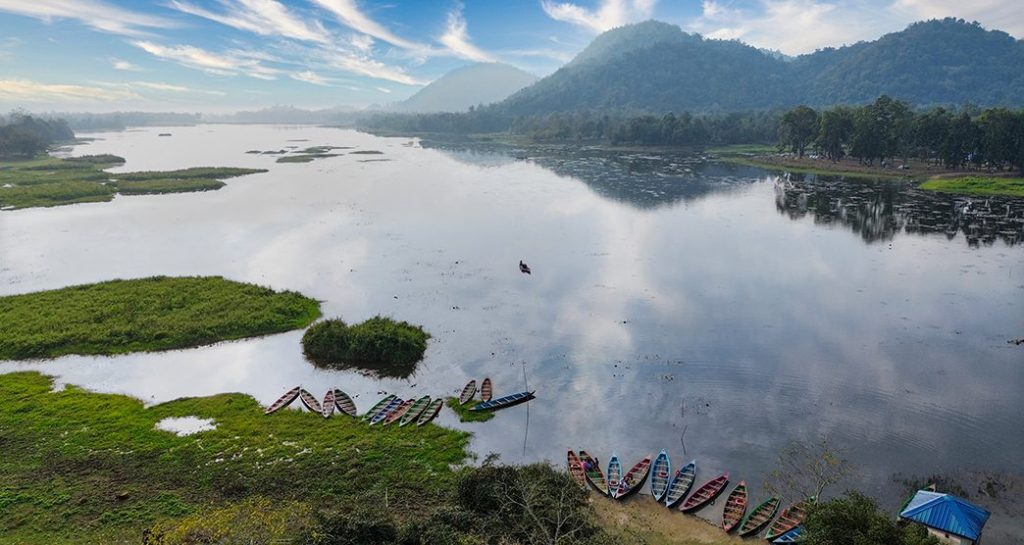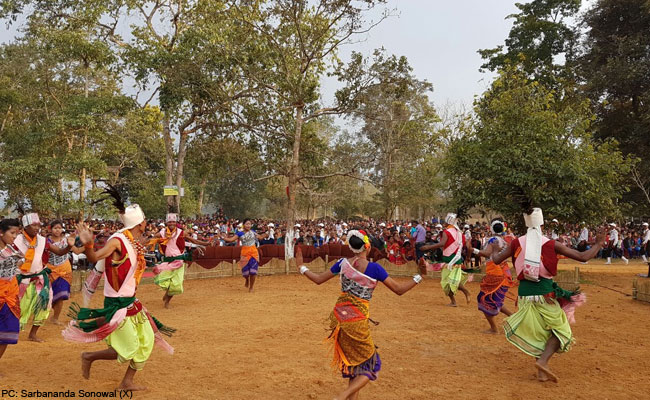Introduction
The Rabha Hajong Chandubi Festival is an important cultural event celebrated by the Rabha and Hajong communities of Assam. It takes place at Chandubi Lake, a picturesque natural lake located in the Kamrup district of Assam, near the Assam-Meghalaya border. This festival is a grand showcase of the indigenous traditions, lifestyle, and heritage of the Rabha and Hajong tribes.
Held annually in early January, this festival marks the beginning of the new year for these tribal communities. It is not just a cultural extravaganza but also a way to promote eco-tourism and indigenous traditions. The festival serves as a platform to highlight the folk music, dance, cuisine, and handicrafts of the Rabha and Hajong people, attracting tourists and culture enthusiasts from across India.

Historical and Cultural Significance
The Rabha and Hajong communities are indigenous tribes of Assam, with a rich history and cultural heritage. The Chandubi region, where the festival is held, is deeply associated with their traditions and folklore.
Mythology and Origin of Chandubi Lake
The Chandubi Lake has an interesting historical background. It was formed during the devastating earthquake of 1897, which caused massive landslides, altering the landscape and giving birth to the lake. According to local folklore, the lake is named after “Chandu Bibi,” a legendary woman from the area. The Rabha and Hajong communities consider this lake sacred and believe it to be a gift from nature.
The festival at Chandubi Lake symbolizes the harmonious relationship between humans and nature. It is a time to offer gratitude to nature for its bounties while celebrating the distinct cultural identity of the indigenous communities.
Major Attractions of the Rabha Hajong Chandubi Festival
The festival is packed with a variety of activities that reflect the cultural richness of the Rabha and Hajong people. Some of the key attractions include:
1. Traditional Dance and Music Performances
One of the highlights of the festival is the mesmerizing performances of Rabha and Hajong folk dances. Dancers, dressed in traditional attire, perform to the rhythmic beats of dhol, flute, and pepa (a traditional Assamese musical instrument). The performances often depict stories from folklore, nature, and daily life.
- The Bagrumba Dance of the Bodo tribe is also sometimes showcased at the festival, promoting cultural diversity.
- Traditional Rabha war dance, performed with energetic movements, is a major attraction.
2. Indigenous Handicrafts and Art Exhibitions
The festival is an excellent platform for local artisans to showcase and sell their handwoven textiles, bamboo products, pottery, and traditional jewelry. Visitors can purchase beautifully crafted Rabha gamusa (handwoven towels), bamboo baskets, and wooden artifacts.
3. Ethnic Food Festival
Food lovers get a chance to indulge in the authentic tribal cuisine of Assam. Some of the must-try delicacies at the festival include:
- Rice beer (Apong or Chu) – A traditional fermented drink prepared by the Rabha and Hajong people.
- Smoked Fish and Meat – A staple in tribal cuisine, known for its rich flavors.
- Bamboo Shoot Dishes – Various preparations using fermented bamboo shoots, a delicacy in Northeast India.
- Rice Cakes (Pitha) – Traditional sweets made from sticky rice and jaggery.
4. Water Sports and Eco-Tourism Activities
Since Chandubi Lake is a natural eco-tourism hotspot, the festival also includes:
- Boat Rides – Visitors can enjoy peaceful boat rides across the scenic lake.
- Fishing Competitions – Traditional fishing methods of the Rabha and Hajong tribes are demonstrated.
- Camping and Trekking – Adventure enthusiasts can explore the nearby forests and hills.
5. Cultural Exchange Programs
Apart from the Rabha and Hajong communities, the festival also welcomes performances from other indigenous groups such as the Bodo, Tiwa, Karbi, and Mishing tribes, making it a multi-ethnic celebration.
6. Traditional Sports and Games
The festival also includes traditional sports events such as:
- Wrestling and Archery Competitions
- Boat Racing on Chandubi Lake
- Tug-of-War and Indigenous Strength Games
Impact of the Festival on Tourism and Local Economy
The Rabha Hajong Chandubi Festival plays a crucial role in promoting rural tourism and eco-tourism in Assam. Over the years, it has gained popularity, attracting travelers, researchers, and photographers who wish to experience the unique tribal culture.
1. Boost to Local Businesses
- The festival generates income for local artisans, weavers, and farmers.
- Home-stays and eco-lodges in and around Chandubi see an increase in visitors.
2. Preservation of Indigenous Culture
- The festival ensures that traditional dances, songs, and handicrafts are passed down to future generations.
- Young members of the Rabha and Hajong communities participate actively, keeping their heritage alive.
3. Promotion of Eco-Tourism
- The festival encourages sustainable tourism by promoting nature-friendly activities.
- Efforts are made to spread awareness about forest conservation and wildlife protection in the region.
How to Reach Chandubi Lake
Chandubi Lake is located about 64 km from Guwahati, Assam’s capital. It is well-connected by road and can be reached in approximately 2 hours by car.
- By Air: The nearest airport is Lokpriya Gopinath Bordoloi International Airport (Guwahati). From there, visitors can hire taxis or take buses.
- By Train: The nearest railway station is Guwahati Railway Station, from where taxis and buses are available.
- By Road: Regular bus and taxi services connect Guwahati to Chandubi. Private vehicles can also be hired for a comfortable journey.
Conclusion
The Rabha Hajong Chandubi Festival is more than just a celebration—it is a cultural identity, an eco-tourism initiative, and a tribute to Assam’s indigenous heritage. With its rich traditions, vibrant performances, and strong environmental message, the festival continues to draw attention from people across the country.
For anyone interested in exploring tribal culture, nature, and Assamese traditions, attending this festival is an unforgettable experience. It is a perfect blend of cultural pride, adventure, and sustainability, making it one of Assam’s most significant indigenous festivals.
FAQ’s
Q. What is the Rabha Hajong Chandubi Festival?
The Rabha Hajong Chandubi Festival is an annual cultural festival celebrated by the Rabha and Hajong tribes of Assam at Chandubi Lake. It showcases traditional music, dance, food, handicrafts, and eco-tourism activities.
Q. Where is the Rabha Hajong Chandubi Festival celebrated?
The festival is held at Chandubi Lake, located in the Kamrup district of Assam, near the Assam-Meghalaya border.
Q. When does the Rabha Hajong Chandubi Festival take place?
The festival is usually celebrated in early January, marking the beginning of the new year for the Rabha and Hajong communities.
Q. What are the main attractions of the Rabha Hajong Chandubi Festival?
Key attractions include:
Traditional dance and music performances
Ethnic food festival
Boat rides and eco-tourism activities
Tribal handicrafts exhibition
Traditional sports and games
Q. How can I reach Chandubi Lake to attend the festival?
By Air: Nearest airport is Lokpriya Gopinath Bordoloi International Airport (Guwahati).
By Train: Nearest railway station is Guwahati Railway Station.
By Road: Chandubi Lake is about 64 km from Guwahati, accessible by buses, taxis, or private vehicles.



